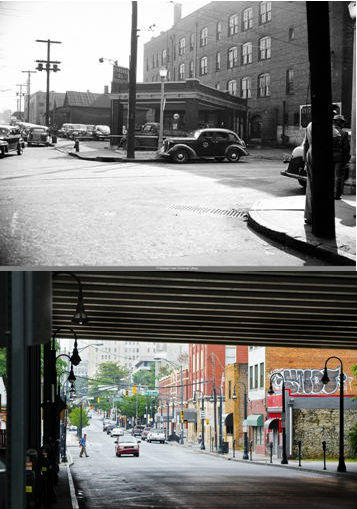
Section Branding
Header Content
Sweet Money For Sweet Auburn
Primary Content

Atlanta’s Sweet Auburn Historic District is among 35 National Treasures designated by the National Trust for Historic Preservation. Those areas are now eligible to share a new $2 million renovation grant from American Express.
The Auburn Avenue area developed after the 1906 race riot in Atlanta. African-Americans were looking for a place where they could conduct business safely. And the area thrived.
In 1957 Fortune Magazine dubbed Auburn Avenue’s commercial district as “The richest Negro street in the world”. It was called Sweet because of the economic vibrancy, and the political prowess that emerged. Dr. Martin Luther King Jr. was born in the neighborhood and he organized the Southern Christian Leadership Conference there.
But Sweet Auburn spiraled into decline in the 1980’s. The National Trust for Historic Preservation named it one of the Most Endangered Historic Places in America in 2012.
The National Trust For Historic Preservation named it a National Treasure, which moves it to the front of the line when preservation funding becomes available.
American Express is donating $2 million to be split among 35 historic sites across the country. It is unclear how much money each site will get. National Trust field officer Joseph McGill says the funds will be used on brick and mortar renovations. He says “There could be some façade work that could be done. There could be some infill work that could be done. There are a lot of empty spaces. We’re not talking a great amount of money that’s going to build a whole building.” But he explains it's a good start. The money could be used to create art installations or community gardens in the empty lots.
McGill emphasizes that this offers a rare chance to help revitalize the commercial district of Sweet Auburn. “There are not a lot of organizations out there that give funding to brick and mortar” he says. “Meaning that funding that can be used to build things. Those dollars are hard to come by at times.” McGill says they will be meeting with local preservationists in Atlanta next week to talk about how to spend the money.
In 1992 Sweet Auburn was also placed on the National Trust list of Most Endangered Historic Places in America. That helped lead to a revitalization of the residential section of the district. Mtamanika Youngblood is board chair of the Historic District Development Corporation, and has helped lead the effort to revitalize Sweet Auburn. She says they worked with a vast array of partners, both public and private. “And that has sparked not just the resurgence of the Martin Luther King Historic District, but also the old Fourth Ward in Atlanta.” She says they now want to turn their attention to the commercial district.
There are challenges. Some of the buildings are 100 years old or more and because they have been designated as historic properties, it will cost more to renovate them. Youngblood says another challenge is that while Sweet Auburn is a redevelopment area, it really hasn’t benefited from redevelopment resources. A variety of stakeholders have formed a new group called Sweet Auburn Works to help gather those resources. Youngblood, who is president of the new organization, says they are in conversation with Invest Atlanta to access those kinds of funds.
There also is concern over how the area will be revitalized. Youngblood says there are several large, institutional property owners on Auburn Avenue who really want to ensure that the way the revitalization occurs is reflective of their legacy as well.
And there is a perception that the area is not safe. Youngblood says there’s no more crime in Sweet Auburn than in other parts of Atlanta. But she says like many African-American neighborhoods across the country, it was split by a highway. The I-75/85 connector brought a viaduct to the area, which has left it feeling dark. Youngblood says they have gotten the Georgia Department of Transportation to improve the area under the viaduct, along with building a maintenance facility for the street car system. That system will be coming on line in April of 2014.
Youngblood says Sweet Auburn has been struggling for the last 20 years because there hasn’t been the political will, resources or leadership to turn things around. But she believes that has changed and she is looking forward to saving part of Atlanta’s rich history so future generations can see the area that nurtured Dr. Martin Luther King Jr, the civil rights movement and the strong heritage of African-Americans in the face of overwhelming odds in the Jim Crow south.
Tags: revitalization, National Trust for Historic Preservation, Sweet Auburn Historic District, Mtamanika Youngblood
